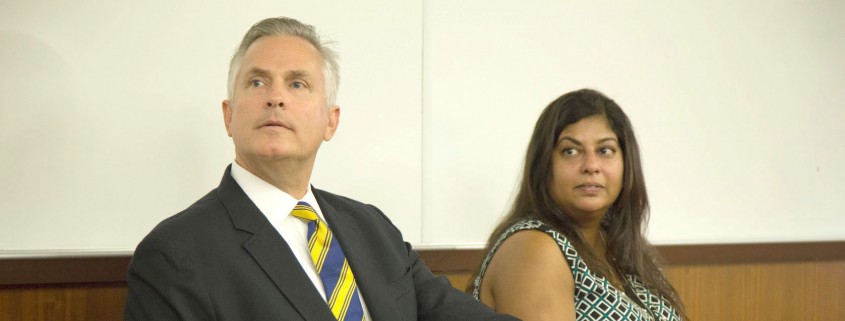Republican debate discussed at PSA roundtable
Panelists discussed the recent Republican debate on CNN and the upcoming Republican national primary at the first California Politics Roundtable discussion of the year hosted by the Political Student Assembly and the Jesse M. Unruh Institute of Politics Wednesday at noon in the Rosen Room of the Ronald Tutor Campus Center.
The panel featured Republican political consultant Matthew Klink and Los Angeles Times political reporter Seema Mehta. Mehta has closely followed the 2016 presidential campaign as well as the 2012 and 2008 campaigns.
The conversation was moderated by Dan Schnur, director of the Unruh Institute of Politics, as well as by the Political Student Assembly director Jenny Di and assistant director Shawn Ren.
Di opened the discussion by asking the panelists how the 2016 presidential campaign is unique compared to other campaigns.
“This campaign has upended conventional political wisdom,” Mehta said, explaining that the rise of outsiders, notably Donald Trump, has created an atypical political field.
Klink noted that Trump’s outsider status gave him a different goal than other candidates.
“Under normal circumstances, in a multi-candidate primary, the goal would be for a candidate to solidify the base, build name identification and raise money,” Klink said. “Donald Trump’s goal is all about keeping name identification high.”
The panel also discussed the historic number of candidates in this year’s primary.
“It really is so early. I think we’re going to see a number of frontrunners between now and February,” Mehta said.
She explained that many had doubted former presidential candidate Rick Santorum, but he eventually won the Iowa caucuses in January 2012. Additionally, presidential candidates can benefit from a campaign even if they lose the nomination.
“Having attention of being a presidential candidate can translate into a television show on Fox News,” Mehta said. “There are other benefits even if you, perhaps, know that you won’t win the nomination.”
The moderators turned questioning over to students. Logan Dallas, a sophomore majoring in international relations, asked the panelists what a potential downfall of Trump’s campaign would look like.
“We’ve already seen an erosion of support,” Klink said.
He explained that the interaction between Carly Fiorina and Trump in the second Republican debate hurt Trump’s campaign.
“You saw the first chink in his armor inflicted by another candidate,” he said. “That opened up the floodgates … Donald Trump is one or two poorly worded statements from torpedoing his own campaign.”
Mehta noted that Trump has a celebrity appeal. She recounted a time when she attended the state fair with Trump and was surrounded by fans clamoring for his autograph and picture.
“It was like a movie premiere,” Mehta said.
The panel discussed the image of government in the media. Katrina Shebanow, a junior studying international relations, asked the panel how Hollywood influenced the image of corruption in Washington, D.C.
Klink believes that television shows like House of Cards hold some truth.
“Are those shows portraying something that’s already there and making it a little more extreme, or are they making it up because that’s what the public already believes?” Klink said. “I have to believe it’s probably more of the former.”
Ida Abhari, a junior studying philosophy and international relations and a writer for the Daily Trojan, asked the panelists how the systemic issue of anti-Washington sentiment could be resolved.
“I think right now it’s very easy to rail against the machine because it doesn’t really matter,” Klink said. “It’s kind of like your summer vacation, what you do for fun.”
Greyson Peltier, a junior studying business administration, asked the panelists how a legitimate presidential candidate could garner support in the Republican party.
“Trump’s advantage is that he’s been on TV for 15 years. Obama’s is that he was incredibly charismatic. You’ve got some really strong candidates that you would never know about,” Klink said. “We spend all this time saying: What do you think Trump said? If we force Trump to be more specific, he’s going to shrink like he did last week. That will allow other candidates to rise.”
Amira Perryman, a senior studying international relations, wanted to know who could get votes from the party base as well as independent votes looking forward.
Klink noted that Carly Fiorina, Jeb Bush and Marco Rubio showed promise.
“If you take hard right social conservatives, most of the rest of them, depending on how they talk about certain issues, could appeal to independents,” Mehta said.

